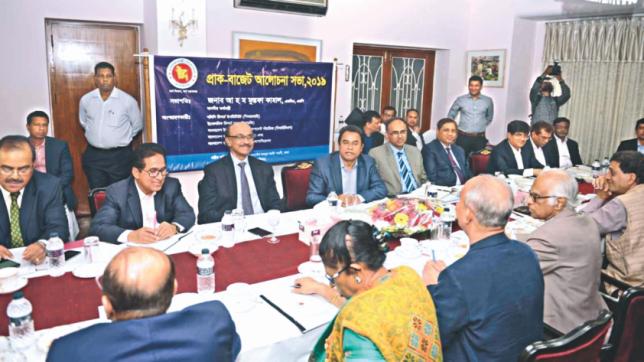Govt devises ways to boost VAT

The government will appoint a revenue official for every 10 electronic fiscal device (EFD), which helps to record sales and VAT payments in businesses, and one of higher rank to monitor 100 such officials to boost revenue collection and create job opportunities.
Finance Minister AHM Mustafa Kamal stated the plan in a pre-budget meeting with economists at state guesthouse Padma in Dhaka on Sunday. Renowned economists Wahiduddin Mahmud, Abul Barkat, Binayak Sen and Zaidi Sattar were present.
The National Board of Revenue (NBR) had made it mandatory last year for all types of businesses—including hotels, restaurants and supermarkets—to start using the EFDs. The step was taken to curb misappropriation of value-added tax (VAT), the biggest source of revenue.
At least 5,000 jobs will be created for 50,000 EFDs and in this way “more than one lakh jobs will be created through the appointment of the revenue officials”, Kamal told journalists after the meeting.
The minister said they would put focus in the upcoming budget on creating “one job in every house”, which was a commitment of the ruling Bangladesh Awami League-led government.
“It is very tough to create such jobs through a single budget. It will be implemented in phases through various initiatives in the coming years,” he said.
Kamal said they would implement the new VAT law from the first day of coming July. “But, it will not be possible to fully implement the law within six or nine months or in one year,” he said.
Earlier in June 2017, a couple of days before it was due to take effect, the government had shelved for two years the implementation of the VAT and Supplementary Duty Act 2012. It stipulated a flat 15 percent VAT for most of the goods and services available in the country.
The new VAT law will comprise multiple rates instead of the previously planned single rate, Kamal told Aksel Sorensen, chief economist at International Monetary Fund. Sorensen, chief of a visiting mission providing technical assistance to the NBR's VAT reform programme, had met Kamal yesterday, the finance ministry said in a statement.
Informing the IMF of the plan to appoint the EFD-related manpower, Kamal said use of the EFDs would be made mandatory so as to prevent the misappropriation of VAT.
The process to purchase the EFDs is currently ongoing and essential goods will not carry any VAT, he added.
The mission informed the minister that they would provide all-out assistance to the automation of revenue collection by the NBR.
In the meeting with economists, the finance minister informed of his new plan about social safety net programmes. He said the government wanted to gradually reduce social safety net allocations in exchange for creating at least one job for every house.
The reason behind the plan was that overlapping plagued a huge amount of money the government allocates for the safety net programmes. The minister said their main focus in the upcoming budget would be job creation, poverty alleviation and providing all urban facilities to every village.
“Our prime minister is committed to providing all urban facilities to every village, and we will start the programme in the upcoming budget. Electricity has already reached every village. Now, we will focus on building infrastructure,” he said.
The upcoming budget will have some new things: it will be written using simple language in short so that everyone could get what it meant, he added. “But the allocation of the budget will not be lower,” he assured.
Many economists of Policy Research Institute, Economic Research Group, Bangladesh Economic Association and the Bangladesh Institute of Development Studies were present at the meeting.
Fazle Kabir, governor of Bangladesh Bank; Abdur Rouf Talukder, finance secretary; Md Mosharraf Hossain Bhuiyan, chairman of the NBR, and Asadul Islam, banking division secretary, were also present.
